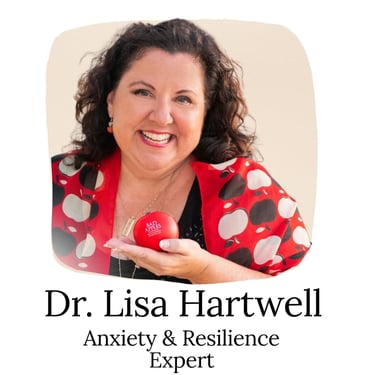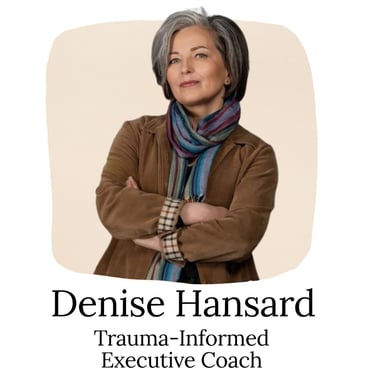Ep 7: Decoding Your Body’s SOS. When Anxiety Becomes Your Ally
How your nervous system might be trying to wave a red flag From the Reflective Space Podcast, hosted and curated by Taniya Hussain
BEFORE YOU WALK AWAY
8 min read



Podcast Guests:
Dr. Lisa Hartwell - Clinical Psychologist, PsyD, RN / High‑Functioning Anxiety & Burnout Specialist / Former Trauma Nurse / Retreat Leader & Speaker / Author – Bad Apples & Anxiety Blueprint
Denise Hansard - Certified Trauma‑Informed Executive Coach / Expert in Shame, Guilt & People‑Pleasing / Founder, Women’s Leadership Coaching / Speaker & Author / Neuroscience-Inspired Mindset Strategist
Sherri‑Lee Woycik - Facebook Ads Expert / Founder, Social Media Minder / Business Coach Empowering Women) / Author & Speaker
Today we are talking about burnout and how anxiety might actually be your most loyal messenger. We'll explore that prickly feeling, what Dr. Lisa Hartwell calls "cactus mode," and how your nervous system might be trying to wave a red flag.
This isn't about pushing through discomfort. It's about learning to hear what your discomfort has been trying to tell you all along.
Taniya: "Explain a little bit about the continuum of burnout."
Dr. Lisa: "So the idea is you'd like to catch it somewhere between the stress and the anxiety stages. So the stress is just the normal stress. You feel like you're exhausted at the end of the day, but you actually recover. You actually get up and, okay, I got a new attitude, and I can keep my sense of humor and I can get back into it. Anxiety is to where, okay, now I'm starting to feel it across a few different areas, right? Like you said, and get a little snappier at the kids, or, my appetite's changed or I feel like my sleep has changed. It starts to affect different systems. That would be when you'd be like, huh. Maybe I need to take a little bit of a break and either have like again, have a conversation, time for a vacation, time to do some personal development work. What does the bigger picture of this mean, et cetera, et cetera. That would be what the overarching continuum looks like."
The Burnout Continuum: Catching It Early
Taniya: "You talked about anxiety not being this scary monster and being your ally."
Dr. Lisa: "Most people wanna come and they want help with you getting rid of their anxiety and at some point. There's a learning curve about actually we need to use whatever that anxiety is telling us. To use it in our favor to grow us. There's different types of anxiety and it's up to you to learn. Because you need to use it as your ally. It's there as your friend. It's there to inform you so you know what your next steps are. So not everybody needs to use their anxiety in a way to just curl up and roll up in bed, right? Sometimes the anxiety is meant to say, oh, maybe I should have paid attention to that conversation. Because it actually meant something as opposed to getting my feelings hurt by it or getting angry about it, or something along those lines. Actually using that in the context of your life, and that's where that orchard piece grounds you because it allows you to look at this from a very different viewpoint instead of the suffering that anxiety causes in your body. Because it's a way of a suffering."
Anxiety as Your Ally, Not Your Enemy
Taniya: "And this is something that I think being, a healthcare professional because we are, the help is really hard. Admit that we are burnt out, that we do need help, what make that a little bit easier?"
Dr. Lisa: "Oh, that's a great question. I feel like there, that's twofold. And the first one is we should have been trained on how to take care of ourselves. Just like they teach you how to take care of a cardiac patient. I feel like they need to have a framework to teach us how to take care of ourselves. And it doesn't exist in programs."
Dr. Lisa: "And then the other piece to that question is always having the preventative sense of knowing when you're gonna reach out. So at least in a lot of areas that I work, there's regular consultation and mentorship and supervision, or honestly just having a cup of tea with a friend. There has to be that element that you recognize. I think I just need a conversation with someone. To get my head back on straight. And then if my head doesn't feel straight and that person's starting to feel like it's too much of a therapist relationship, then maybe it's time for me to feel comfortable and seeking out support from either a coach like yourself some people go on vacations and they feel better, but it is about that self-awareness. Of knowing where you are in the continuum of burnout. And not waiting until you're at the end of the wick essentially."
Why Helpers Weren't Taught Self-Care
The Five Warning Signs: From Irritability to Existential Crisis
Taniya: "What would you say would be the top three to five signs that to watch out for that might have, make you go from anxiety to burnout?"
Dr. Lisa: "that's a great question. I would say it, looking at it on levels of severity that would be how the word I would use. For instance, the difference between irritability and anger. So one of the top signs would be start watching yourself when the irritability starts to come up, and I call it cactus. It's just like you feel prick prickly, you feel like, don't touch me, don't hug me. I'm just feel little like irritable. It's, but it's, but you're not angry, right? You're just feel uncomfortable. That would be definitely a sign."
Dr. Lisa: "The, another one that always impacts people is insomnia. People treat insomnia with pills or, smoking substances and such, or drinking wine and, or alcoholic things and to each its own. But the point is it's more about the change in your behavior. If you're finding that you're needing more and more that your thing isn't working anymore. That would be a telltale sign.
Another one for sure. I break it into your interpersonal functioning and then your relationship functioning. So if it's a matter of, you're starting to feel more argumentative than normal. That would be another sign, whether it be with people at work, with your spouse, with your kids, with the person that they're at your pharmacy. You just feel more argumentative and testy. That would be the recognition, and then maybe the final one would be when it manifests physically."
Dr. Lisa: "The other one I would touch on. It's probably would be like a whole nother conversation when you're feeling like you have what people know as an existential crisis. Which means you've lost your meaning, you've lost your hope with what you're doing. And that's a little bit higher on the continuum, there's this little bit of push about this just doesn't even make sense anymore. And that's a real big one for people who are working. Number one in trauma and definitely with criminal justice clients."
Taniya: "And that is when sort of depression is probably really, and anxiety."
Dr. Lisa: "Anxiety too. 'cause anxiety is probably the precursor to that. 'cause you feel just more anxious about hearing the stories and. Not wanting to hear the stories and it's where, and you don't necessarily feel sad about it until you feel hopeless."
Taniya: "And we had a case of a social worker who took her life. And yeah, it was something that really touched me, and I think there was gonna be an inquiry about why that happened, when you have that existential crisis that you lose any joy sometimes because you are so used to helping others, it's very hard. I know in my case it's only in the last year I've realized we are not lone islands. We are interdependent and interdependent. Is a strength. It's something that we all need as human beings. But it's something very difficult to do when you have most of your life. Spent helping and helping. And when you start isolating yourself, 'cause I think that would be another side, when somebody's not talking, they're not talking to people that they love, they've just completely isolated themselves and they're getting really quieter."
Taniya: "Because I felt that in my life when I've being in really very dark places with personal crises and not being able to share that with friends even because I feel like, oh my God, I'm such a failure. How do you get past that shame and guilt? Embarrassment."
When Crisis Becomes Dangerous
Denise: "I wanna talk about that in a broad view because of course we know that guilt and shame comes from some of our past stories. Not feeling worthy, not loving ourselves, always feeling as if we're lacking in some way, shape, or form. But the guilt and the shame really comes from that aspect of loving ourselves fully."
Taniya: "All critical voices are not necessarily. Our enemies. Sometimes critical voices, are showing this is danger and that actually can be our survival. It can actually mean that we, like it safeguards us."
Breaking Through Shame and Self-Worth
Taniya: "What do you do to look after yourself?"
Sherri-Lee: "And for me, this is a constant evolution I'm getting better with checking in with myself. I'm getting aware of the signs that I haven't taken enough care of myself sooner. So it's, it doesn't come to that big eruption anymore. Because I focused on my awareness and going back to that whole thing of never feeling good enough I ask myself, is this my belief or is it somebody else's? And if it's not mine, there's a lightness that comes about and most of what I believe isn't mine, I've discovered. And so then I can just move on once I acknowledge it. And I remind myself that just 'cause I feel like other people might judge me doesn't mean that I'm wrong. And I'm starting to hear that. So that just 'cause somebody else sits in judgment, I'm able to go, that's okay. It's come down to really honoring myself as much as I honor others, if not more. So self-care is still an ongoing process for me. And I check in with myself every day. How am I feeling? And I'm starting to really recognize those warning signs."
Sherri-Lee: "And I was so completely removed from myself that I didn't even know those warning signs. I remember talking to people years ago about this and going when you start feeling like you're gonna blow up, how does that feel before. I'm like, I don't know. I wasn't even aware of what was happening in my body before the blow up because I was so outside of my experience. But now I can sit here and I can feel, oh, there's this churning that starts, there's this, edgy feeling that I get. And I know that if I don't listen to that, if I keep pushing through that, that I'm gonna go to that blow up. And so now I know, but it's taken a long time to even get aware. Of what those warning signs are in advance."
Learning to Check In With Yourself
Taniya: "The next time, anxiety grips your chest or exhaustion drags at your bones. Try this, pause, breathe, and ask, what is this here to teach me? Your discomfort isn't noise. It's data that tightness in your throat may be a boundary waiting to be set. The dread before a meeting, perhaps a value being violated, even burnout itself, a desperate wisdom screaming this way of living is unsustainable. So don't just manage your symptoms. Partner with them. Thank your anxiety for its vigilance. Honor your fatigue for its protection because the body never lies. It just speaks in sensations. Until next time, may you treat every uneasy feeling, not as a weakness to fix, but as a compass pointing you back to yourself."
Your Body Never Lies
The breakthrough insight: The next time anxiety grips your chest or exhaustion drags at your bones, pause and ask: "What is this here to teach me?" Your discomfort isn't noise — it's data. That tightness in your throat may be a boundary waiting to be set. The dread before a meeting, perhaps a value being violated. Even burnout itself is desperate wisdom screaming: this way of living is unsustainable.
Don't just manage your symptoms. Partner with them. Thank your anxiety for its vigilance. Honor your fatigue for its protection. Because the body never lies — it just speaks in sensations.
May you treat every uneasy feeling not as a weakness to fix, but as a compass pointing you back to yourself.
Subscribe at dancingwithdarknessbook.com
Dancing With Darkness
A transformative journey from darkness to light.
© 2025. All rights reserved.